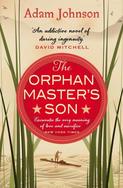
If you're going to be traumatised by a novel, it must be a good one. If you're going to go to bed, anxious at what monsters your dreams will churn up, let it be on account of a story worthy of the Pulitzer Prize. After nearly 600 pages in the Democratic Republic of North Korea, at least you you can go back to your own life when it's over. Such a pity the same can't be said of the novel's protagonist, the orphan, Jun Do. Or should that be Commander Ga?
It’s not that there are no stories in this imagined North Korea. Like children in nursery school, or the days of single channel TV, everyone must attend to the year’s Best North Korean Story, broadcast into their homes and workplaces through the ever-present loudspeakers. Orphans, the lowest of the low in this society, are taught, through an allegorical story, that their lives have been saved by the eternal love of Kim Jong Il. Even the hardened interrogators can quote of their favourite lines from the moralising movies of the state cinema.
Yet these aren’t stories I’d be proud to write, or look forward to settling down to read. In a society where orphans are scapegoated rather than pitied, stories don’t seem to facilitate empathy in those who hear or read them. In a country where creativity is stifled, stories are designed to keep people in their place. Children, weaned on a diet of propaganda, are confused on being told a tale in which nothing is glorified. With little personal autonomy, character is without meaning. Stories don’t reveal a deeper truth, but turn it upside down, yet no-one dares acknowledge the emperor has no clothes:
there was only one penalty, the ultimate one, for questioning reality, how a citizen could fall into great jeopardy for simply noticing that realities had changed (p544).
When you have a subject’s biography, there is nothing between the citizen and the state (p239).

























 RSS Feed
RSS Feed





















